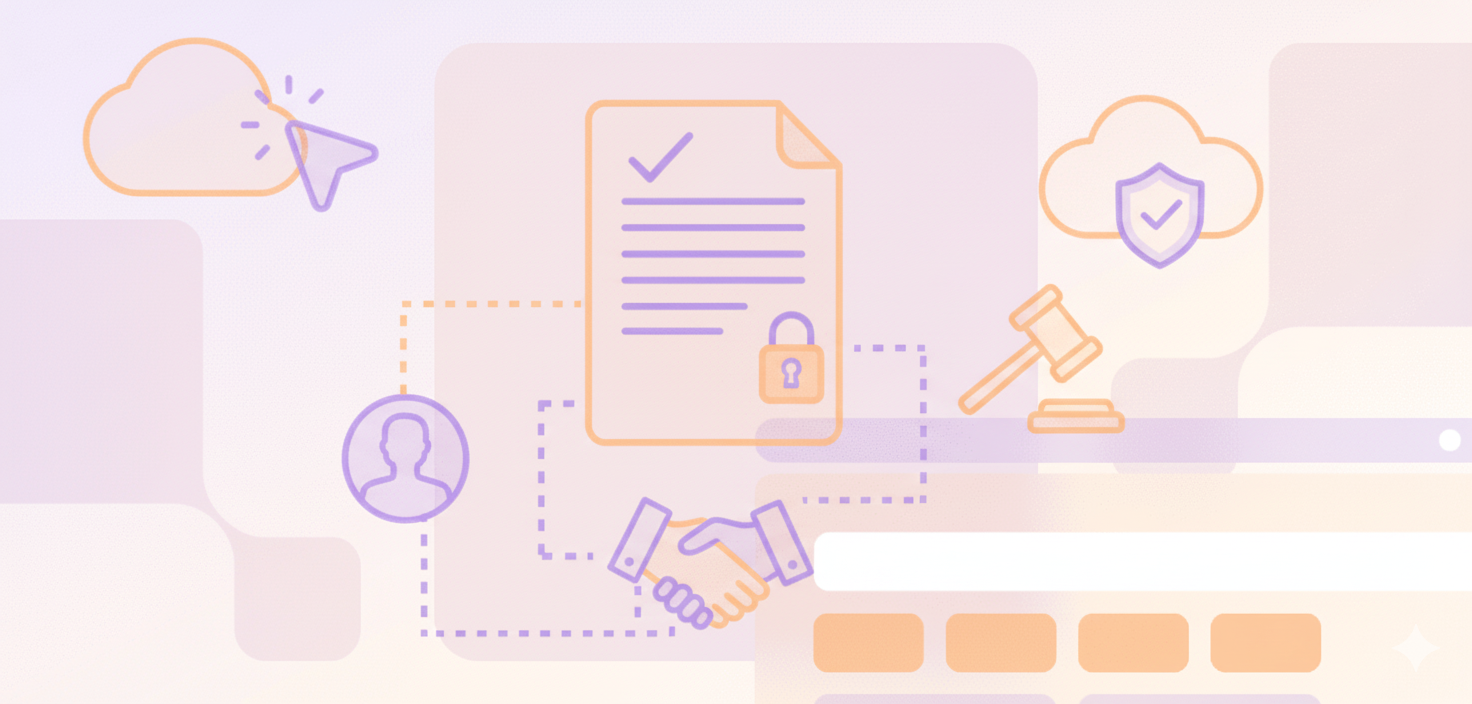Legal și conformitate
Ce este un Acord de Licență pentru Utilizatorul Final (EULA)?

Ce este un Acord de Licență pentru Utilizatorul Final (EULA)?
Un Acord de Licență pentru Utilizatorul Final (EULA) este un contract legal între un furnizor de software și utilizatorul software-ului.
Acesta definește termenii și condițiile în care software-ul poate fi utilizat, în special pentru a proteja proprietatea intelectuală a dezvoltatorului de software.
EULA-urile acordă utilizatorului dreptul de a utiliza software-ul în conformitate cu termenii specificați, clarificând îndatoririle utilizatorului și drepturile vânzătorului, care includ drepturile de utilizare, clauzele de exonerare și excluderile de răspundere.
Găsite inițial în formate fizice, cum ar fi ambalajul sigilat (shrinkwrap), EULA-urile au evoluat în acorduri digitale „clickwrap” și sunt obligatorii din punct de vedere legal, deci este important să le înțelegeți înainte de a utiliza software-ul.
De ce este un Acord de Licență pentru Utilizatorul Final (EULA) important?
Un Acord de Licență pentru Utilizatorul Final (EULA) este crucial deoarece:
- definește termenii în conformitate cu care software-ul poate fi utilizat.
- protejează dezvoltatorii de software prin stabilirea utilizării restricționate, păstrarea drepturilor de proprietate și limitarea răspunderii lor.
- servește ca un contract obligatoriu din punct de vedere legal, care specifică ce este permis și ce nu pentru utilizatori, protejând drepturile de proprietate intelectuală.
Utilizatorii finali trebuie să fie conștienți că acordurile EULA pot include clauze de exonerare de răspundere și pot împiedica utilizatorii să solicite căi de atac legale.
Când este necesar un Acord de Licență pentru Utilizatorul Final (EULA)?
Acordurile EULA trebuie utilizate ori de câte ori software-ul este pus la dispoziția utilizatorilor finali, fie că este distribuit, vândut sau furnizat ca soluție SaaS.
EULA-urile protejează software-ul proprietar împotriva utilizării necorespunzătoare și a potențialelor cereri de despăgubire, specificând clar că utilizatorilor li se acordă acces și nu proprietate asupra produsului.
Aceasta include:
- aplicații desktop
- aplicații mobile
- achizițiilor în aplicație
- Produse SaaS
- orice tip de software la care utilizatorii pot contribui.
Elaborarea unui EULA este un pas important, chiar dacă software-ul în cauză este gratuit. Prin intermediul EULA-urilor, dezvoltatorii de SaaS își pot proteja fluxurile de venituri și pot evita utilizarea necorespunzătoare și copierea.
Care sunt clauzele comune găsite într-un Acord de Licență pentru Utilizatorul Final (EULA)?
EULA-urile comune includ restricții privind:
- utilizarea software-ului
- acordarea licenței
- proprietatea intelectuală
- probleme de răspundere
- prelucrarea datelor.
Aceste clauze servesc la abordarea preocupărilor de afaceri și de proprietate intelectuală ale dezvoltatorului, precum și la înțelegerea de către utilizator a aspectelor legale ale software-ului.
Ca atare, ele includ de obicei restricții împotriva ingineriei inverse, a creării de opere derivate și a redistribuirii software-ului.
Dacă aceste clauze nu sunt respectate, pot exista consecințe legale.
Care este diferența dintre un Acord de Licență pentru Utilizatorul Final (EULA) și Termenii de Serviciu (ToS)?
EULA-urile și ToS-urile nu sunt același lucru.
- EULA-urile sunt pentru software și privesc licența de utilizare a software-ului.
- ToS-urile sunt pentru site-uri web și servicii online și stabilesc regulile și reglementările privind modul de utilizare a serviciilor.
Ambele acorduri au implicații legale, definind parametrii de utilizare a software-ului și a serviciilor atât de către proprietar, cât și de către utilizator.
Este necesară înțelegerea rolurilor și efectelor acestor două acorduri.
Care sunt consecințele încălcării unui Acord de Licență pentru Utilizatorul Final (EULA) și cum este aplicat?
Iată cum companiile SaaS aplică un Acord de Licență pentru Utilizatorul Final (EULA):
- Companiile de software trimit de obicei o notificare utilizatorului, informându-l despre încălcare și solicitând remedierea.
- Dacă încălcarea nu este remediată, compania își rezervă dreptul de a rezilia licența, ceea ce ar întrerupe accesul la software. În cazuri mai grave, compania ar putea iniția acțiuni legale, care ar putea implica amenzi, despăgubiri și alte sancțiuni stabilite de instanță.
Pentru a evita aceste consecințe, este mai bine să citiți și să respectați cu atenție termenii EULA înainte de a utiliza software-ul, deoarece EULA este un document juridic obligatoriu.
Care sunt avantajele și dezavantajele creării unui Acord de Licență pentru Utilizatorul Final (EULA) pentru software-ul meu?
Crearea unui EULA bine redactat este crucială pentru furnizorii de software, oferind atât protecție, cât și claritate.
- Acesta stabilește un cadru legal care protejează proprietatea intelectuală și definește drepturile utilizatorilor.
- Acesta include măsuri pentru a aborda încălcarea drepturilor de autor și ingineria inversă, cu intenția de a proteja proprietatea intelectuală.
- Influențează răspunderea furnizorului, ceea ce ar putea corela cu o probabilitate mai mică de litigii legale legate de utilizarea necorespunzătoare a software-ului.
- Clarifică drepturile și restricțiile utilizatorului, promovând transparența și reducând potențialele litigii între utilizatori.
- Se referă la menținerea fluxului de venituri prin controlul partajării neautorizate sau al aplicării comerciale a software-ului.
Cu toate acestea:
- Crearea și menținerea unui EULA complet necesită expertiză juridică, ceea ce poate genera costuri.
- Un EULA excesiv de strict poate descuraja utilizatorii, afectând implementarea activului.
- Dacă există părți neclare ale EULA sau dacă acesta conține declarații iresponsabile, sau dacă EULA contravine legilor țării, acest lucru poate genera probleme juridice.
Concluzie
Un Acord de Licență pentru Utilizatorul Final (EULA) este un acord legal între un furnizor de software și un utilizator final care definește termenii de utilizare a software-ului. Acest acord este creat pentru a proteja proprietatea intelectuală și a defini drepturile și responsabilitățile utilizatorului. Indiferent dacă sunteți un dezvoltator de software sau un utilizator final, respectarea acestor termeni contribuie la stabilirea unui cadru definit și legal pentru toate părțile implicate.